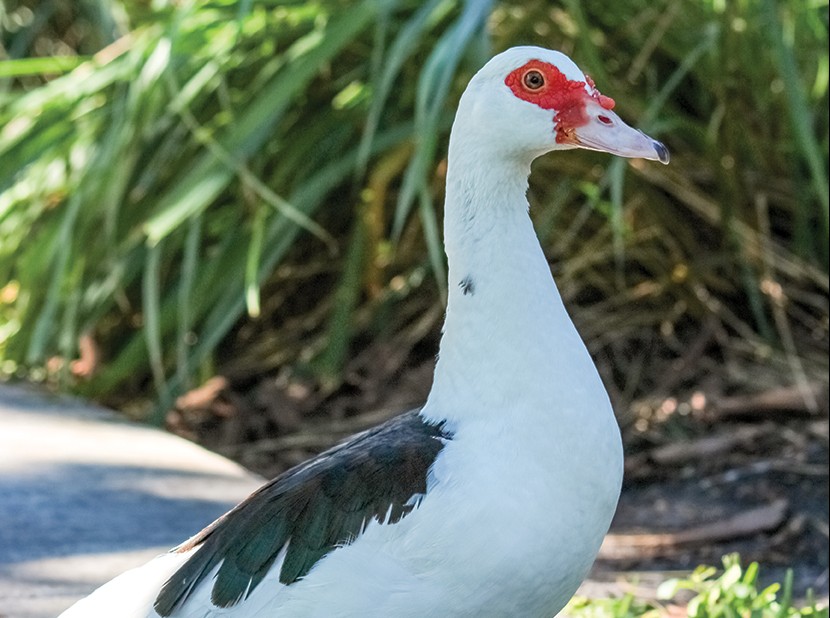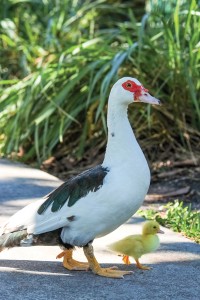

A staple of wildlife on the University of Miami Coral Gables campus, the Muscovy duck has waddled around UM for decades. Recently, however, the school has removed a number of them due to health and safety concerns.
See More: Questions remain about university’s duck control
On Jan. 20, David Dyer, weekend and night operations manager of the Student Center Complex, approached two men outside the Mahoney Pearson Dining Hall who appeared to be trapping the birds. One of the men told Dyer that they were licensed trappers with permission from the university to remove the ducks. UM’s Office of Media Relations confirmed in a statement that some of the ducks were being removed from school grounds.
“Facing concerns over health and safety risks caused by a growing population of Muscovy ducks on campus, the university took the appropriate steps to humanely remove 14 of the non-native species in close proximity to the Mahoney Pearson Dining Hall,” university spokesperson Margot Winick said. “In accordance with U.S. Fish and Wildlife Service rules, a firm was hired to handle the one-time removal. No further action is planned.”
When asked about President Julio Frenk’s upcoming inauguration and the associated beautification happening around campus, Winick said the timing and removal of the ducks was not related to it in any way.
The man Dyer spoke with said that the ducks were going to be released at Baptist Hospital of Miami in Kendall. Winick did not say where they were taken or what happened to them upon being removed. The hospital did not respond to questions regarding the ducks.
According to the Florida Fish and Wildlife Conservation Commission (FWC), if Muscovy ducks are on private property, landowners and wildlife management agencies can control the duck population without federal or state permits. The birds may be humanely euthanized, but it is illegal to capture and release them elsewhere. The exception to the FWC rule comes from a Federal Control Order for Muscovy ducks that states the birds can only be relocated to public museums or institutions for scientific or educational purposes. Otherwise, they must be buried or incinerated.
The Muscovy ducks are an invasive species native to Central America and northern South America. They are sedentary birds, meaning that they do not migrate for different seasons, according to the FWC. They can, “be extremely prolific and local populations can increase dramatically in a short time.”
After his encounter, Dyer contacted the University of Miami Police Department, who said that they were aware of a company hired to remove the ducks. UM Police Department Captain William Gerlach declined to comment on the issue.
Although the university’s statement cited health and safety concerns, the Animal Rights Foundation of Florida states, “There is no evidence that Muscovy ducks transmit disease to humans, or otherwise pose a public-health threat.”
The caveat is that there is a possibility of the ducks transmitting diseases to other animals.
“We consider Muscovy ducks to be undesirable in the wild because of their potential to transmit diseases to or interbreed with Florida’s native waterfowl,” according to the FWC.
Professor William Searcy, an ornithologist at UM, said their removal would not have a major impact on the campus ecosystem. An ornithologist studies birds and all aspects of bird life.
“The Muscovy ducks are an invasive species and are considered a nuisance. Their removal would have little effect on the ecology of campus,” Searcy said.
Freshman Jake Bozentka is not a fan of the ducks on campus.
“I do not like them. I think they follow you and they are just in the way constantly,” Bozentka said.
Sophomore Alejandro Rojas thinks the ducks were a key part of the campus.
“I can’t see [University of] Miami without the ducks, even the people who were here 10 years ago always talk about the ducks,” Rojas said.
Other members of the community consider the ducks and other wildlife on campus a crucial part of what makes UM special.
“I think totally removing the ducks from campus really is not the way to go,” Nicholas Rau, associate director of the Student Center Complex, said. “I think the wildlife is a neat part of campus that makes UM unique.”
Bernie Alfonso, who visits campus to feed the feral cats and Muscovy ducks, is often involved with the wildlife on campus as an animal rights activist. Alfonso directs the non-profit organization Pet Partners Rescue Home, which is dedicated to housing stray domestic animals. He strongly disapproves of the university’s removal of the ducks.
“In my 53 years of living here, I have never been so angry with the university,” he said.
The school did not comment on the age or sex of the ducks removed.
Correction, Jan. 26, 9:30 a.m.: This article originally included a quote from Nicholas Rau that read, “I think removing the ducks from campus really is not the way to go…” Rau’s position has also been corrected.
Correction, Jan. 26, 9:12 p.m.: The previous correction spelled Rau incorrectly.






